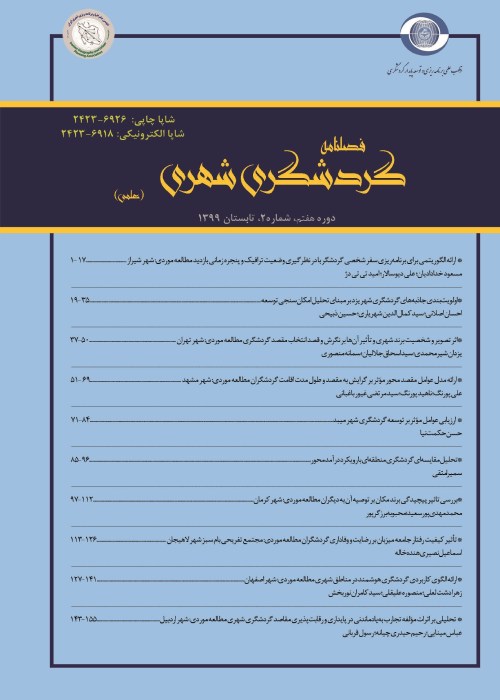Analysis of the role of social and cultural factors in the development of ecotourism in Zanjan
In recent years, managers and planners in the city of Zanjan, as one of the historical and influential regions of Iran, have been trying to improve the position of this destination in the tourism industry. This region has long played a special role in the exchanges of civilizations due to its economic, cultural and political position as well as due to its special geographical location. Zanjan city is a source of cultural and tourism assets that in the presence of numerous historical monuments, creating maps in cultural and historical events, mirrors and ceremonies, the unique and rooted lifestyle of its inhabitants throughout history, literary resources and scientific, cultural and civil institutions, and in general, a collection of cultural heritage and tourist attractions. Paying attention to this region's social and cultural structure in the development plans as a tourist destination and using the tourism development strategy can contribute to the economic, social and cultural growth and revive the atmosphere of this region. Accordingly, the present study, while addressing the theoretical gap of tourism in which the role and position of social and cultural factors in the development of ecotourism has been neglected, seeks to answer the basic question as follow:-What effect social and cultural factors on the development of ecotourism in Zanjan?
The present study is applied and descriptive-analytical research in terms of purpose and method, respectively. A questionnaire was used to collect information. The questionnaire questions were designed using a range of five Likert options from strongly agree to disagree strongly. The statistical population of this study included university professors, employees of the Cultural Heritage Organization, experts in the field of tourism, etc., including 396 people. The sample size was estimated at 213 people using Cochran's formula. The validity of the questionnaire was confirmed in two stages of face and face validity by obtaining opinions from professors and experts and divergent validity was calculated by calculating the mean-variance index (AVE). The reliability of the questionnaire was measured by calculating Cronbach's alpha and calculating the combined reliability coefficient (CR) and was confirmed. In this study, SPSS and AMOS software programs were used to analyze the research data.
The findings of this study indicated that in connection with the hypothesis that cultural factors have a significant effect on the development of ecotourism in Zanjan. The path coefficient (0.48) is estimated. Also, in such a way that the value of T statistic obtained is equal to 5.67 and is greater than 1.96. In addition, the value of the significant level obtained is equal to 0.001, since the value of the significant level obtained is less than 0.05; therefore, this path coefficient is significant and the research hypothesis is confirmed, so it can be said that cultural factors have a significant impact on the development of ecotourism in Zanjan. Also, according to the value of the obtained path coefficient, it can be stated that 23% of the variance of the variable depends on cultural factors, which include the components of cultural heritage protection, cultural exchanges, handicraft development, development and expansion of eco-lodges, tourism, and cultural attractions of the region, can be explained.In connection with the social factors hypothesis, it significantly affects the development of ecotourism in Zanjan. The path coefficient (0.38) is estimated. Also, the T statistic value obtained is equal to 3.89 and is greater than 1.96. In addition, the value of the obtained significant level is equal to 0.003, since the value of the significant level obtained is less than 0.05. Therefore, this path coefficient is significant and the research hypothesis is confirmed, so it can be said that social factors have a significant impact on the development of ecotourism in Zanjan. Also, according to the value of the obtained path coefficient, it can be stated that 14.4% of the variance of the dependent variable can be explained by social factors, which include the components of social interaction, security, participation, and education.
Findings from the test of research hypotheses also showed that cultural factors positively affected the development of ecotourism in Zanjan. In fact, because tourism itself is a cultural thing, more than other modern phenomena of human life, its development is influenced by cultural factors and components. Based on this finding, it can be said that attention to cultural factors and components has an important place in the planning and management of tourism development. In managing attractions, especially in coordination with the destination, attention should be paid to tangible and intangible cultural components. Take measures to manage the cultural exchanges of the destination and guests. Due to its cultural and indigenous roots, cultural factors have a high impact on tourism development and provide an opportunity to attract tourists seeking authentic experiences in areas with cultural treasures, which can lead to the development of tourism and thus lead to economic benefits for tourism purposes. Therefore, the protection of cultural factors, including cultural and historical heritage, while maintaining the attractiveness of tourism destinations will lead to better development of these destinations. The second hypothesis test findings showed that social factors had a positive and significant effect on the development of ecotourism. Based on this result, it can be claimed that by strengthening the social components in tourism destinations while helping to develop tourism better, its negative effects on local communities are reduced. At the same time, its positive effects are strengthened, and more social development opportunities are forthcoming. The goals are set. Accordingly, destinations with stronger social infrastructure can enjoy more benefits and positive effects of tourism development.
- حق عضویت دریافتی صرف حمایت از نشریات عضو و نگهداری، تکمیل و توسعه مگیران میشود.
- پرداخت حق اشتراک و دانلود مقالات اجازه بازنشر آن در سایر رسانههای چاپی و دیجیتال را به کاربر نمیدهد.



